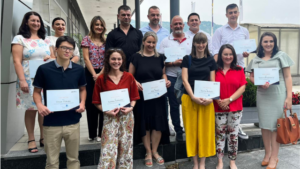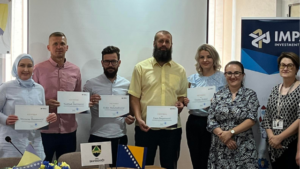Although it has been 20 years since the Dayton peace agreement was signed—which ended the civil war—and despite being the heart of Europe, Bosnia and Herzegovina still faces economic, social, and political challenges. The country has been attempting to move forward economically, but it’s constantly caught in the middle of ethnic division that slows down and sometimes completely eliminates positive change, especially for the country’s youth. They face a number of challenges including an indifferent attitude by the government and industry toward their needs.
In many developed countries, young people are treated as the most valuable resource in their economic development. Those countries invest heavily in their development through high-quality education, employment training opportunities, job creation, and connection to globally relevant leadership forums. Young people in Bosnia and Herzegovina deserve these same opportunities but, unfortunately, they don’t have them. For example, there is little collaboration among universities, and industry-university collaboration is almost nonexistent. Student collaboration across the country occurs only when it is pushed by other countries, nongovernmental organizations, and professional societies such as IEEE.
Unfortunately, a large majority of young professionals are leaving the country to seek opportunities elsewhere. This poses major challenges to the future development of the country and is a serious loss for the greater community. There are limited employment opportunities for highly skilled engineers, information technology professionals, and scientists. A majority of students cling to the hope that they will land a job in one of the larger institutions such as national telecommunications companies or utilities, or with state agencies. Some of those organizations employ double the number of employees they really need. It is not sustainable for the companies, and it limits opportunities for the young professionals who want to join the organizations.
VENUE FOR COLLABORATION
For those and other reasons, we decided to help form IEEE Bosnia and Herzegovina Section’s Young Professionals affinity group, which was established this year. From 1 to 4 December, the group is holding the BiH IEEE Student and Young Professionals Congress in Sarajevo. The event is focusing on providing the country’s youth with insight into the various opportunities that exist within IEEE. The congress also will be a platform for ongoing collaboration, allowing students and young professionals to think creatively, develop new ideas, and work with the IEEE global community to realize their dreams. Through technical and nontechnical workshops, industry lectures from global experts, and professional networking and social events, I hope that attendees will create new contacts, erase ethnic boundaries, and develop collaborative relationships with industry in Bosnia and Herzegovina and around the world. We are working together with the IEEE Bosnia and Herzegovina Section and the Youth Employment Project (YEP), which is supported by the Swiss Embassy, to deliver a world-class entrepreneurship congress.
The centerpiece of the congress is an Ideation-Innovation Hackathon. Months prior to the congress, 13 student groups from eight universities worked with academic and industry advisors to develop innovative products and services with the hope that they can transform them into exciting startups. They are working on health care applications, food production and processing, renewable energy, and transportation. Under the guidance of industry professionals and other experts, students and young professionals will gain a greater understanding of the innovation cycle during this one-day event. Innovation and entrepreneurship entail developing the ability to tackle problems creatively, generate new ideas, take calculated risks, and create change to achieve goals.
At the end of the day’s activities, all teams will present their innovations to a panel of local and international experts from a variety of sectors, including angel investors. The top three teams will receive cash prizes and the opportunity to be mentored by industry and innovation experts to help them develop and commercialize their innovations. I, together with the Youth Employment Project, private investors, and IEEE student groups, plan to launch several startups next year as a result of the congress.
Innovation is a key driver for increasing living standards and quality of life. Many Bosnians and Herzegovinians have demonstrated their ability to innovate and commercialize scientific and engineering research, but they have done so outside their homeland. That entrepreneurial and innovative culture has not yet thrived in the homeland. In an economy that is plagued by political instability and the inability to provide employment opportunities for youth, I want to encourage them to innovate in order to prosper.
Creativity, imagination, and technology have no boundaries. They do not discriminate against race, sex, or religion and have no political allegiance. IEEE strives to advance technology for the benefit of humanity and, through its members, to inspire a global community to innovate for a better tomorrow. With this congress, IEEE, together with its student members and young professionals, will demonstrate their commitment to empowering and inspiring the next generation of engineering and technology leaders, who will play a pivotal role in helping Bosnia and Herzegovina flourish.
Eddie Custovic is the editor in chief of Impact, the publication of the IEEE Young Professionals group, and is the chair of the IEEE Victoria Section. He also serves on the IEEE Publication Services and Products Board (PSPB). He is the vice chair for products and services for the IEEE Young Professionals Committee. In his day job, he is an academic and industry project coordinator at La Trobe University. He is the founder and director of the university’s Innovation and Entrepreneurship Foundry, an interdisciplinary research, development, and commercialization laboratory.





